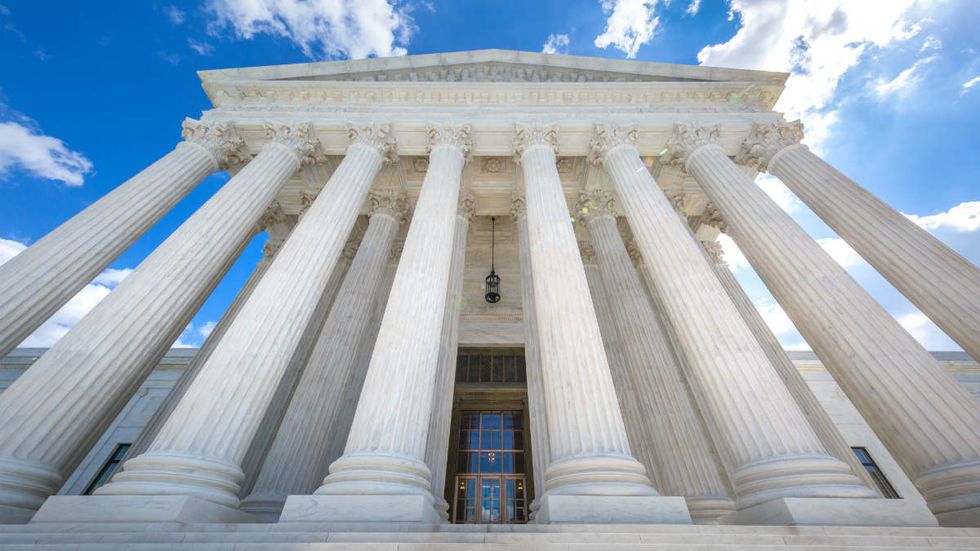
© 2025 Blaze Media LLC. All rights reserved.
The cost of judicial supremacy: 60 million. Not dollars. Lives. As we mark today’s grim 46th anniversary of Roe v. Wade, it’s important to remember that 60 million lives have been lost because we perpetuate the notion that one branch of government stands above the other two federal branches and the 50 states.
Today you will hear and see many inspirational speeches and tweets about the importance of life. You will receive copious fundraising emails from phony conservative groups promising to fight this travesty. But after 46 years of failure, it’s quite evident that they want this issue around as a campaign tool rather than to actually solve it. There is only one solution, and that is not “appointing better judges.” It’s spending our political capital to push back on the entire notion that the federal judiciary, including now a single district judge, is the final say on all political, social, and cultural issues.
Not only have we failed to reverse this travesty by delegitimizing judicial supremacy, we’ve gone backward. We’ve now allowed courts to create abortion rights for illegal aliens. We’ve allowed them to mandate taxpayer funding for organizations that engage in baby harvesting. And in case you thought that “appointing better judges” to continue legitimizing the supremacy game, rather than ending the supremacy game, is the solution, we learned last year that we didn’t even have four votes to reverse a lower court opinion giving Planned Parenthood a right to state Medicaid funds. If you think we are on the cusp of five votes to repeal Roe, you are not paying attention.
From Roe onward, the courts have been able to concoct “fundamental rights” that are not only absent from the Constitution, they are antithetical to our founding values and infringe upon our unalienable rights. Thus, our Constitution has been ruled unconstitutional. Courts can redefine humanity; they can redefine marriage; they can redefine national borders and sovereignty.
It was through the Roe decision (among other Warren-era decisions) that the 14th Amendment, which was intended to do nothing more than guarantee freed black citizens the life, liberty, and property rights of every other citizen, was perverted into a mandate for “rights” that would have shocked the Reconstruction-era Congress.
At the time of the adoption of the 14th Amendment in 1868, 36 states and territories had laws on the books banning abortions. Yet we are told that the Constitution, and even the 14th Amendment as originally conceived, is unconstitutional and pre-empted by the evolving interpretation of the 14th Amendment, which is rooted in nothing but the political imagination of the judges. And unlike politicians who must stand for re-election, these judges now get to engage in political issues, serve as the final authority, and never stand accountable before the people.
And we, as conservatives, acquiesced to the notion that every utterance from any judge is “the law of the land,” not the laws that are actually duly passed or the Constitution as written. We acceded to the dangerous premise that the courts have sole and final say over political issues and are not merely co-equal. When Republicans have had control of all branches of government, they’ve refused to pass legislation stripping the courts of jurisdiction, a power of Congress just as strong as its power to coin money. What force does a judge have to enact policy? Only the force we give to him.
The Roe decision was the spawn of the 1857 Dred Scott travesty, because that opinion laid the foundation for “substantive due process,” a legal myth that I have super-rights to strip other human beings of their inalienable rights. Black people were deemed as property by the court, and thus the court declared that the Missouri Compromise, which barred slavery in the northern portions of the territories and was law for 37 years, was unconstitutional. In Roe, the judges used this concept to decide the question of when life begins. Then they used it to decide what a marriage is. Now they are using it to decide what a citizen is.
But why do we go along with this charade? Even during Lincoln’s time, there was only one major issue in which the judiciary asserted itself, not every major issue like today. During the famous Lincoln-Douglas debates, Lincoln himself noted how throughout Douglas’s career, the former Illinois state judge always subscribed to the Jeffersonian view of three equal branches deciding constitutional questions, not one branch. Lincoln was abundantly clear that other branches of government have an obligation to follow the real law and that Douglas was inventing a novel concept of judicial supremacism just because he liked this particular outcome.
During the sixth debate with Douglas, Lincoln asserted: “Judge Douglas understands the Constitution according to the Dred Scott decision, and he is bound to support it as he understands it. I understand it another way, and therefore I am bound to support it in the way in which I understand it.”
How do we apply this principle of decompartmentalism today?
When Republicans controlled numerous state governments and, for a period, all three political organs of the federal government, they had an obligation to push back against unconstitutional court decisions. As Lincoln observed, courts can adjudicate individual cases, but if they seek to use those rulings as a way of setting political policy across the nation, it should never be regarded as a “political rule” to be “binding on the members of Congress or the President to favor no measure that does not actually concur with the principles of that decision.”
To this day, Republicans have never even attempted to push back in any way against even a single district judge.
During the fourth debate, Lincoln mocked Douglas’ dogmatic obsession with Dred Scott’s decision to deem blacks as property. He scoffed at his adherence to this principle “not because he [Douglas] says it is right in itself … but because it has been decided by the court, and being decided by court, he is, and you are bound to take it in your political action as law — not that he judges at all of its merits, but because a decision of the court is to him a ‘Thus saith the Lord.’
The crowd that day in Ottawa, Illinois, on August 21, 1858, roared with laughter as Lincoln kept chanting "Thus saith the Lord," to mock the notion that immoral and illegal court rulings on fundamental national questions are the universal law of the land. He closed his remarks with the following parody of Douglas, whom he continued to refer to as “Judge” instead of “Senator” throughout the debate:
But I cannot shake Judge Douglas's teeth loose from the Dred Scott decision. Like some obstinate animal (I mean no disrespect), that will hang on when he has once got his teeth fixed; you may cut off a leg, or you may tear away an arm, still he will not relax his hold. And so I may point out to the Judge, and say that he is bespattered all over, from the beginning of his political life to the present time, with attacks upon judicial decisions — I may cut off limb after limb of his public record, and strive to wrench him from a single dictum of the court — yet I cannot divert him from it. He hangs, to the last, to the Dred Scott decision. [Loud cheers.] These things show there is a purpose strong as death and eternity for which he adheres to this decision, and for which he will adhere to all other decisions of the same court.
How appropriate for our times. We’ve countenanced this notion that every last word of a judge is self-executing and universally binding over all branches of government. We complain about these rulings, but then our “conservative” leaders declare, “It’s the law of the land until we can overturn it,” as if a court ruling is somehow like a statute. We allow unelected judges to amend our Constitution on a daily basis, but then declare that the only way to restore our republic is for us to amend the Constitution back through an impossible process. Now, we pre-emptively refrain from pursuing lawful and prudent policies because we fear the courts will use their powerless hand to declare it illegal. Some states won’t even attempt to pass pro-life legislation that doesn’t even conflict with Roe simply because the courts loom so large.
How sad it is to see, 162 years after Dred Scott, 46 years after Roe, and four years after Obergefell, that we’ve never flinched from this erroneous view that anything and everything a judge says is the universal law. As Lincoln warned throughout the debates with Douglas, once one insane opinion is “the law of the land,” then there is nothing that is not the law of the land:
It marks it in this respect, that it [Dred Scott] commits him to the next decision, whenever it comes, as being as obligatory as this one, since he does not investigate it, and won't inquire whether this opinion is right or wrong. So he takes the next one without inquiring whether it is right or wrong. He teaches men this doctrine, and in so doing prepares the public mind to take the next decision when it comes, without any inquiry.
What is the next immoral court opinion our side will complain about but still countenance as “the law of the land?”
Rather than giving feel-good speeches about the importance of life, maybe it’s time we finally demonstrated that commitment by delegitimizing this judicial veto that was never adopted in our Constitution. In doing so, we will save another 60 million lives and everything else about our republic to boot.
#mc_embed_signup{background:#fff; clear:left; font:14px}
/* Add your own MailChimp form style overrides in your site stylesheet or in this style block.
We recommend moving this block and the preceding CSS link to the HEAD of your HTML file. */
Want to leave a tip?
We answer to you. Help keep our content free of advertisers and big tech censorship by leaving a tip today.
Want to join the conversation?
Already a subscriber?
Blaze Podcast Host
Daniel Horowitz is the host of “Conservative Review with Daniel Horowitz” and a senior editor for Blaze News.
RMConservative
Daniel Horowitz
Blaze Podcast Host
Daniel Horowitz is the host of “Conservative Review with Daniel Horowitz” and a senior editor for Blaze News.
@RMConservative →more stories
Sign up for the Blaze newsletter
By signing up, you agree to our Privacy Policy and Terms of Use, and agree to receive content that may sometimes include advertisements. You may opt out at any time.
© 2025 Blaze Media LLC. All rights reserved.
Get the stories that matter most delivered directly to your inbox.
By signing up, you agree to our Privacy Policy and Terms of Use, and agree to receive content that may sometimes include advertisements. You may opt out at any time.



